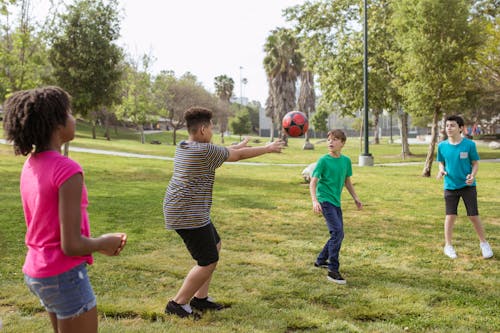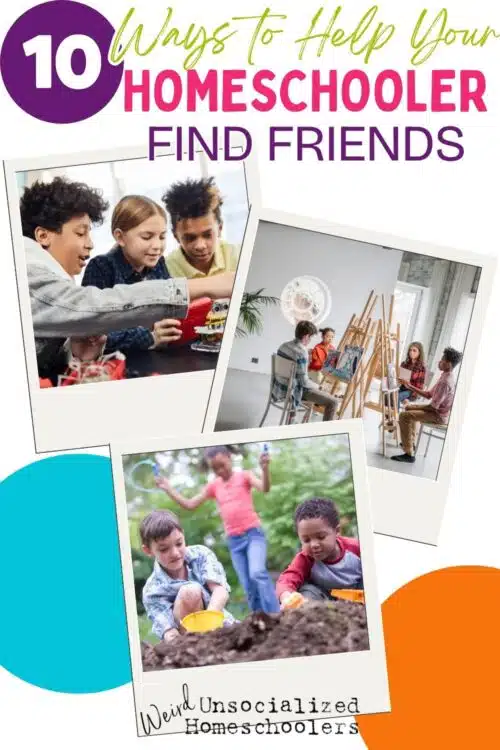10 Easy Ways to Help Your Homeschooler Find Friends
A year or so of at-home schooling for U.S. students successfully changed the perception of homeschooling for many. These days, more people will concede that the stereotypical image of a weird, unsocialized homeschooler doesn’t fit most homeschooled kids. However, if you are a family new to (or considering) homeschooling, have recently moved, or live in an area without an active homeschool community, you may have legitimate reasons to wonder how to help your homeschooler find friends.
I remember wondering the same thing eons ago when we were a new homeschooling family – and again nearly a decade into homeschooling before my youngest met her BFF. Over the years, I’ve discovered several tips and resources that have proven successful for us and other homeschooling families.

Easy Ways to Help Your Homeschooler Find Friends
If your child is struggling to find her people, try these simple tips to help your homeschooler find friends.
1. Join A Support Group
An excellent way to get involved with local homeschoolers is to join a homeschool support group. Most organizations offer a variety of opportunities to get together, such as field trips, play dates, co-ops, and holiday parties. Search for homeschool support groups by state on Homeschool Legal Defense Association’s Home School Organizations page. You can find more groups listed by county when you click on the link for your state.
You can also go directly to your statewide support group’s website to find local listings. Most statewide homeschool associations maintain a listing of support groups within the state. If neither of those work, try searching your state name plus the keywords “homeschool support group.”
2. Check Out Online Groups
For many years, my local source of homeschool support was a Yahoo-based email group. (Anybody remember those?) The group began in my family’s first year of homeschooling with three or four homeschooling moms who barely knew each other but desperately wanted to forge friendships for our kids and ourselves.

Within a few years, it grew into a huge group of over 100 families that became an incredible source for making friends, both online and off. The group eventually moved to Facebook and continued to grow.
Check your local homeschool support group’s website for links to their social media accounts or search for local groups directly on Facebook. One of the benefits of an online support group is that members can get to know each other online, alleviating some of the awkwardness that can accompany meeting in person for the first time.
Online groups are also a fantastic way of making connections with the homeschooling community ahead of time if you’re going to be moving to a new area. It was quite common for out-of-town families to join our group before moving to the area. They really appreciated having new friends eager to meet them when they arrived!
3. Visit Kid-Friendly Places During School Hours
Head to your local playground, library, indoor play area, or children’s museum. Any place where kids tend to congregate is worth checking out. (Chick-fil-A was always one of our favorites!) If there are school-aged children there during regular school hours, there’s a pretty good chance that they’re homeschoolers. Don’t be afraid to ask. We’ve made friends that way a few times.
And, by “ask,” I mean, your kids can ask the kids or you can strike up a friendly conversation with the parent and ask them. Don’t just ask the kids. That’s creepy.
4. Join Homeschool Classes Or Co-Ops
While the emphasis may be on learning in class or co-op settings, there’s always a little time for kids to chat before or after. Suggest a group play date or schedule something with the parents if you notice that your child has made a connection. If you’ve got older kids, you may not have to do much of anything. My teens usually come home from classes with a new social media friend or two and numbers saved to their phones for texting.
As a side benefit, you get a break from teaching one or more subjects that maybe aren’t your favorites or that are enhanced by a group setting approach.

5. Host A Get-Together
Whether it’s a book club, an art show, a nature club, or just a play date, if you invite them, they will come (usually). If you’re not comfortable hosting an event in your home, try a local park, a kid-friendly restaurant, a library, or even a bookstore.
Our homeschool group had two very successful book clubs at our local bookstore – one for middle school and up and a group for younger students that was more of a story time with a craft project to keep the littles occupied while the big kids talked.

6. Go To Homeschool Events
My youngest met her BFF at a homeschool dance hosted by a local organization. It wasn’t our support group, but a larger group that hosts community-wide social events for homeschoolers throughout the year. The two girls had a few mutual friends, so they wound up hanging out and chatting during the dance.
My son also met his BFF (they’ve been friends for more than a decade now!) at one of our early email-based group’s homeschool outings. The other boy’s mom was one of the parents who got to know some of the other moms through the email group before their move here from out of state, so score one for online homeschool support groups!
7. Go To Church
Yeah, I know not everyone attends church, and you shouldn’t go just to meet friends. However, we are church-goers, and ours has been a fantastic place for forging friendships. My son and his BFF met Musketeer #3 (also over a decade-long friendship for the three) at church.
The kids have met other friends in their life groups on Sunday morning and youth group on Sunday night. Because it’s a large church with students from a variety of local schools (public, private, and home), we don’t have to deal with too much of the clique-iness that can happen when all the kids know each other from school.
8. Pursue Hobbies
Pursuing your child’s hobbies has the added benefit of providing a fantastic way for him to meet friends. Common interests can provide the spark that ignites a fledgling friendship. Consider activities such as:

- Sports
- Drama and community theater
- Dance
- Homeschool or community classes such as art, photography, music, or baking
- Volunteering (My kids used to love volunteering at the local animal shelter!)
- Scouting
- 4H
- Music classes or choirs
When we first began homeschooling, my oldest was into all things American Girls. We heard about a small, parent-led group that met weekly to read the books, do a craft, and make a recipe. There were only four or five girls who attended, but that’s where my oldest met her kindred spirit. They’re both now approaching 30 years old and still maintain contact!
Whatever your child’s interests, check out your local homeschool support group’s newsletter or social media outlets (like our Hip Homeschool Moms Facebook Community), check community event pages, and follow related groups or businesses on social media to keep up with events that might provide a chance both to pursue that interest and forge new friendships.

9. Be Bold in Helping Your Homeschooler Find Friends
While Megan and her BFF did meet and chat at a dance, it wasn’t until the other girl’s mom called and suggested a hang out (or whatever you call it when they’re teenagers and too grown for play dates) that they really cemented their friendship. The mom and I were acquainted through homeschool circles. When she learned that Megan and her daughter had talked and discovered some common interests, she stepped way out of her comfort zone by calling me and arranging a time for the girls to get together, and the rest is history.
If your child hits it off with a potential friend at an event and they’re unlikely to see each other on a regular basis afterward, take the initiative to provide opportunities for them to get to know one another.

10. Maintain Friendships
If you’re transitioning from public school to homeschool or moving to a new area, make an effort to maintain your kids’ current friendships. Arrange visits and play dates or let the kids chat over Skype or FaceTime. Encourage them to write letters and provide time for them to talk on the phone, text, email, or chat over Facebook.

Leave time in your school schedule for your kids to hang out with their public school friends after school, on weekends, and on school holidays.
Most kids just need an opportunity to get together to start forming friendships. Fostering those friendships may take a little more work for homeschooling parents than it would for parents of children in a typical school setting, but the results are worth it.
And, remember, because homeschooled kids aren’t segregated into similar age groups like kids in traditional school settings, age differences don’t really mean much to them. So, don’t limit potential friendships to kids close to your kids’ age.
How have your homeschooled kids met their friends?
Kris Bales is a newly-retired homeschool mom and the quirky, Christ-following, painfully honest founder (and former owner) of Weird, Unsocialized Homeschoolers. She has a pretty serious addiction to sweet tea and Words with Friends. Kris and her husband of over 30 years are parents to three amazing homeschool grads. They share their home with three dogs, two cats, a ball python, a bearded dragon, and seven birds.







This- “If your child hits it off with a potential friend at an event and they’re unlikely to see each other on a regular basis afterward, take the initiative to provide opportunities for them to get to know one another.” is key. I’ve found that because I model organizing social gatherings for my children, they are now taking the initiative to plan their own gatherings. They’re young enough that they still need my help, but often create, plan, and mostly execute clubs, playdates, and parties. The parent saying yes to the socialization is also a big part of all this!
One of the best ways I have helped my son make friends here is by scheduling regular “playdates.” Every Friday he has 2-3 kids that are siblings over. Every Thursday he goes over to another person’s house. When you aren’t in school with the same kids every day, it’s hard to build the level of familiarity with other kids to make real friends. Occasional homeschool meet-ups don’t cut it. And you have to be proactive, don’t assume that other people’s kids already have too many friends. Often they are in the same boat as you.
Joining homeschool websites where events are posted and going to as many as your kid is interested in…especially if you’re new to an area. We moved out of state this year and had to start all the way over but bc of this…my kids made friends in no time and joined the homeschool league basketball team and in 8 months its ALMOST like we’ve been here our entire lives.
My grandson is twelve and homeschooled. His father works all the time and his mother doesn’t drive. As a result he has no friends other than his adult cousins. He is very active and intelligent, but he is lonely. He puts on good front, but it’s an angry tough guy one.
Can you recommend a place in Glassboro NJ?